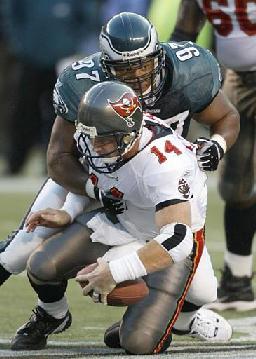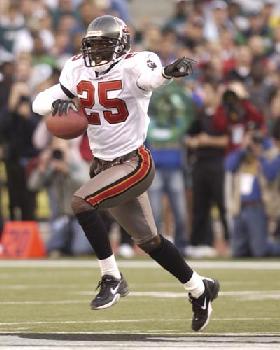|
|
 |
 Scott Smith, Buccaneers.com, published 21 October 2002
Scott Smith, Buccaneers.com, published 21 October 2002
The Tampa Bay Buccaneers couldn’t be accused of coming out flat in Veterans Stadium on Sunday, as was the general observation of their last two trips to Philadelphia, both unsuccessful playoff visits. Unfortunately, despite a spirited effort in this critical battle for NFC bragging rights, the Buccaneers encountered a painfully similar result. Tampa Bay’s offense failed to put the ball in the end zone and Eagles’ QB Donovan McNabb created just enough big plays to give the home team a 20-10 victory.
The first big play was a 42-yard touchdown pass to WR Todd Pinkston in the second quarter, just two plays after a dazzling, 29-yard punt return by veteran return man Brian Mitchell. Mitchell was a thorn in the Bucs’ side all afternoon, picking up 61 yards on five punt returns and 83 yards on three kickoff returns. McNabb then scored the clinching touchdown himself on a one-yard run in the fourth quarter, just two plays after an apparent Dexter Jackson interception had been erased by a penalty. The Eagles had gained possession for that 42-yard scoring drive on a sideline, toe-dragging interception by a former Buccaneer, CB Al Harris. On the play, the Bucs also lost their starting quarterback, Brad Johnson, to bruised ribs.
 Rob Johnson relieved Brad Johnson for the ensuing possession, and managed to drive Tampa Bay to a first-and-goal at the Eagles five. However, three passes into the end zone were well defended and the Bucs, down by two scores, opted to go for the field goal. When K Martin Gramatica’s 29-yarder sailed wide left, the Eagles could simply run out the clock with a first down or two. The Eagles got that and more, thanks to a breakaway, 57-yard run by RB Duce Staley against a Buc defense that was stacked in the box and unable to recover when Staley burst through the first line of tacklers. Until that final drive, the Eagles had just 200 yards of offense against a Buccaneer defense that usually kept McNabb in the pocket, in contrast to those two playoff losses. Even with the late gains, Tampa Bay’s top-ranked defense held Philadelphia to 269 yards, allowed just 12 completions and 14 first downs and sacked McNabb twice.
Rob Johnson relieved Brad Johnson for the ensuing possession, and managed to drive Tampa Bay to a first-and-goal at the Eagles five. However, three passes into the end zone were well defended and the Bucs, down by two scores, opted to go for the field goal. When K Martin Gramatica’s 29-yarder sailed wide left, the Eagles could simply run out the clock with a first down or two. The Eagles got that and more, thanks to a breakaway, 57-yard run by RB Duce Staley against a Buc defense that was stacked in the box and unable to recover when Staley burst through the first line of tacklers. Until that final drive, the Eagles had just 200 yards of offense against a Buccaneer defense that usually kept McNabb in the pocket, in contrast to those two playoff losses. Even with the late gains, Tampa Bay’s top-ranked defense held Philadelphia to 269 yards, allowed just 12 completions and 14 first downs and sacked McNabb twice.
The Bucs’ defense also scored for the fifth time this defense, briefly giving the Buccaneers the lead in the first half. DE Simeon Rice, a former high school teammate of McNabb’s in Chicago, sacked the quarterback with a chop of his arm, forcing a fumble that LB Derrick Brooks, perhaps the NFL’s most opportunistic defender, returned 11 yards for a touchdown. It was Brooks’ fourth defensive TD of the season. Unfortunately, that would be the only time the Bucs’ would reach the end zone. Midway through the third quarter, Gramatica pulled the Bucs to within a field goal, at 13-10, by nailing a 48-yarder to cap a 50-yard scoring drive.
 Philadelphia scored first, early in the first quarter, as Tampa Bay’s second play from scrimmage resulted in a turnover. CB Bobby Taylor forced FB Mike Alstott to fumble after a short pass, and LB Barry Gardner recovered for the Eagles at Tampa Bay’s 14. A leaping pass breakup by Rice on a heavy third-down blitz forced Philly to settle for David Akers’ 30-yard field goal. Akers also had a 35-yarder on the Eagles’ first possession of the third quarter.
Philadelphia scored first, early in the first quarter, as Tampa Bay’s second play from scrimmage resulted in a turnover. CB Bobby Taylor forced FB Mike Alstott to fumble after a short pass, and LB Barry Gardner recovered for the Eagles at Tampa Bay’s 14. A leaping pass breakup by Rice on a heavy third-down blitz forced Philly to settle for David Akers’ 30-yard field goal. Akers also had a 35-yarder on the Eagles’ first possession of the third quarter.
Besides the two turnover-induced scores, the first half was a battle of punts brought on by two swarming defenses. Neither team got anywhere near the other’s end zone, with the field-position edge surging back and forth. The Bucs hurt their own cause with repeated illegal blocks on their punt returns, and the Eagles nearly created a disaster when a bouncing punt hit an unsuspecting Bobby Taylor in the leg. The Eagles recovered, however, at their own 14. Return man Brian Mitchell also fumbled another punt deep in the Philly zone, but recovered it himself. The Bucs also avoided a catastrophe of their own between those two Eagle muffs, as a Brandon Whiting sack from behind of Brad Johnson forced a fumble. G Cosey Coleman alertly beat several Eagle defenders to the ball.
Mitchell’s long return was the key special teams play of the half, however. When Pinkston got behind the Bucs’ defense and caught a beauty of a deep ball from McNabb, it was the first touchdown allowed by the Tampa Bay defense in nearly 14 quarters. The Bucs had held their last three opponents – Cincinnati, Atlanta and Cleveland – without an offensive touchdown. Still, the first half was clearly a defensive struggle. Philadelphia held the ball for eight more seconds, gained five more yards (114-109) and had three more points. The Bucs had two more first downs (6-4) and ran the ball slightly better (52 yards to 42), but never mounted an offensive scoring threat.
 Tampa Bay’s only scoring drive on offense came late in the third quarter. After McNabb had led the Eagles to a field goal of their own on the home team’s first possession of the half, the Bucs answered with a 50-yard march ending in Gramatica’s 48-yarder. The Bucs moved most of the way with Michael Pittman runs and Alstott receptions, and were helped by a 15-yard penalty when DE Hugh Douglas hit Brad Johnson late.
Tampa Bay’s only scoring drive on offense came late in the third quarter. After McNabb had led the Eagles to a field goal of their own on the home team’s first possession of the half, the Bucs answered with a 50-yard march ending in Gramatica’s 48-yarder. The Bucs moved most of the way with Michael Pittman runs and Alstott receptions, and were helped by a 15-yard penalty when DE Hugh Douglas hit Brad Johnson late.
The Bucs ran the ball fairly well, picking up 81 yards on just 21 carries, led by Pittman’s 49 yards on 12 totes. Before he was injured, Brad Johnson completed 19 of 31 passes for 124 yards, no touchdowns and one interception, and he was sacked five times. Rob Johnson completed four of seven passes for 31 yards in relief, and also ran three times for 10 yards. The Bucs’ offense, which had allowed just six sacks in the last five games, often struggled against Philly’s blitzes and gave up another six this afternoon. CB Brian Kelly intercepted a first-quarter pass for Tampa Bay, though the Bucs failed to capitalize. The two teams combined for seven fumbles on the afternoon, but only two changed hands.
With the loss, the Bucs end a five-game winning streak and fall to 5-2 overall. With a New Orleans victory earlier in the day, the Bucs find themselves a game out of first in the NFC South. Philadelphia improves to 4-2 on the year.
|

|
|
| |
| |
|